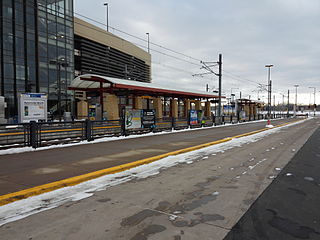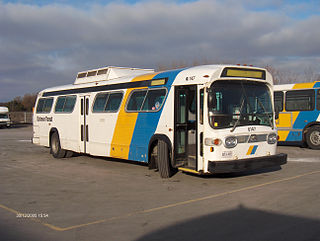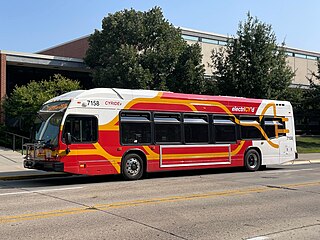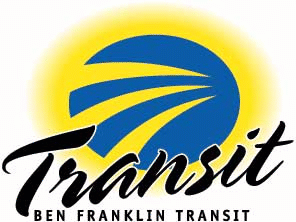
TransLink, formally the South Coast British Columbia Transportation Authority and previously the Greater Vancouver Transportation Authority, is the statutory authority responsible for the regional transportation network of Metro Vancouver in British Columbia, Canada, including public transport, major roads and bridges. Its main operating facilities are located in the city of New Westminster.

The West Coast Express is a commuter railway serving the Lower Mainland region of British Columbia, Canada. It is owned and operated by the region's transit authority, TransLink. Opened in 1995, it provides a link between Metro Vancouver and the Fraser Valley Regional District and is the only commuter railway in Western Canada. In 2023, the system had a ridership of 1,304,400, or about 6,000 per weekday as of the first quarter of 2024.
Metro Transit is the primary public transportation operator in the Minneapolis–Saint Paul area of the U.S. state of Minnesota and the largest operator in the state. In 2023, the system had a ridership of 44,977,200, or about 142,700 per weekday as of the first quarter of 2024.

The American Public Transportation Association (APTA) is a nonprofit group of approximately 1,500 public and private sector member organizations that promotes and advocates for the interests of the public transportation industry in the United States.

ComfortDelGro Corporation Limited, commonly known as ComfortDelGro, is a multi-national transport group based in Singapore. It is listed on the Singapore Exchange that operates more than 40,000 vehicles across 12 countries. It was formed on 29 March 2003 through a merger of Singaporean land transport companies Comfort Group and DelGro Corporation.

30th Avenue station is a light rail and bus station on the Blue Line in the Twin Cities region of the U.S. state of Minnesota. The station opened with the second phase of the Hiawatha Line on December 4, 2004. It has a 1,585-space park and ride facility. The south parking lot was closed for construction of a 1,443 space parking ramp, which opened in Fall 2008.
Keolis is a French transportation company that operates public transport systems all over the world. It manages bus, rapid transit, tram, coach networks, rental bikes, car parks, water taxi, cable car, trolleybus, and funicular services. Based in Paris, France, the company is 70% owned by SNCF and 30% owned by the Caisse de dépôt et placement du Québec.
Neoplan USA was a major transit bus manufacturing company based in Denver, Colorado. It started as a subsidiary of the German corporation Neoplan in 1981 with its main factory and headquarters in Lamar, Colorado. In 1998, Neoplan USA was acquired by Willis Stein & Partners and became an independent licensee of designs from the German company Neoplan. The company declared bankruptcy in 2006.

Oshawa Transit was a public transit operator in Oshawa, Ontario, Canada, from 1960 to 2005. Its only garage and headquarters was located at 710 Raleigh Avenue in Oshawa.

CyRide is a partnership between Iowa State University, the ISU Student Government, and Ames, Iowa. CyRide provides public transportation to the community throughout the city of Ames. The word CyRide is a portmanteau of two words: Cy and the word ride. In January 2012, CyRide was recognized "as the nation’s small urban transit system with the highest number of rides per capita" at 106 rides per capita. In 2019, CyRide ranked third in the nation with 110.2 rides per capita, behind the transit systems of New York and San Francisco.

I-35W & Lake Street station is a bus rapid transit station along the Metro Orange Line and planned B Line bus rapid transit (BRT) routes in Minneapolis, Minnesota. In addition to the BRT services, the station is also served by Metro route 578, Minnesota Valley Transit Authority routes 460, 465, 467, 470, 472, 475 and 477, along with SouthWest Transit routes 600 and 695.

Ben Franklin Transit is the operator of public transportation in Franklin and Benton counties in the U.S. state of Washington. Eighteen routes provide local service for the three component urban areas of the Tri-Cities: Richland, Kennewick, and Pasco. Five routes connect the Tri-Cities metro area, as well as extend to the municipalities of Benton City, Prosser, and West Richland. Most routes run six days a week. Bus service runs between 6AM and 10:00PM, Monday-Friday and 7AM and 10:00PM on Saturdays and select holidays. Trans+Plus covers the Tri-Cities portion of the service area 8:30PM to 12:00AM Monday-Saturday and 7:30AM to 6:00pm on Sundays. There is also an ADA Paratransit service Dial-a-Ride for those who are physically unable to use the regular transit bus service. In 2023, the system had a ridership of 3,171,000, or about 24,300 per weekday as of the first quarter of 2024.

Metro is a transit network in Minnesota serving the cities of Minneapolis and Saint Paul. It also provides service to some suburban areas. As of 2022, the system consists of two light rail lines and five bus rapid transit (BRT) lines all of which are operated by the local public transit company: Metro Transit. The five lines connect Downtown Minneapolis and St Paul with the Bloomington, Minneapolis-St Paul International Airport, Roseville, Richfield, Burnsville and Brooklyn Center.

The New Flyer Xcelsior is a line of transit buses available in 35-foot rigid, 40-foot rigid, and 60-foot articulated nominal lengths manufactured by New Flyer Industries since 2008. In addition to the different available lengths, the buses are sold with a variety of propulsion systems: conventional diesel, compressed natural gas (CNG), diesel-electric hybrid, hydrogen fuel cell, overhead electric wire and battery electric. A future autonomous bus variant was announced in January 2021.

In the New York metropolitan area, dollar vans are a form of semi-formal public transportation. Dollar vans serve major corridors in Brooklyn, Queens, and the Bronx that lack adequate subway and bus service. A variant of the dollar van, the jitney, also serves areas in eastern New Jersey and transports them to Manhattan.
A roadeo is a competitive driving event for motor vehicle drivers. Named as a portmanteau of "road" and "rodeo", these competitions have been held for a range of different vehicles since at least 1937. Typically, drivers compete to pass through a variety of obstacles in the smallest amount of time, although the competitions may include other components, such as a written test.

The Metro C Line is a bus rapid transit line in Brooklyn Center and Minneapolis, Minnesota operated by Metro Transit. The line is part of Metro Transit's Metro network of light rail and bus rapid transit lines. The route operates from the Brooklyn Center Transit Center along Penn Avenue and Olson Memorial Highway, terminating in downtown Minneapolis. The route is analogous to the existing Route 19 and is projected to increase ridership on this corridor from 7,000 to 9,000 by 2030. Eventually, part of its route will shift south to Glenwood Avenue from Olson Memorial Highway.

Brooklyn Center Transit Center (BCTC) is a transit center in the Minneapolis suburb of Brooklyn Center, Minnesota. Owned and operated by Metro Transit, it is one of the busiest single boarding locations in the Twin Cities. The transit center is not a park and ride, but provides free 10-minute parking and free outdoor bike racks. June 8, 2019 Metro Transit's second bus rapid transit line, the Metro C Line, opened with Brooklyn Center Transit Center as the line's northern terminus. The Metro D Line opened in December 2022, also using the center as its northern terminus. The transit center opened December 4, 2004 and cost $1.9 million. Before opening of the C Line, charging stations were installed for end-of-the-line charging of 8 battery electric buses used on the C Line and D Line.

Ford & Woodlawn is a bus rapid transit station on the Metro A Line in Saint Paul, Minnesota.

The NABI BRT is a line of low-floor transit buses available in 60' articulated (60-BRT) and later 42' rigid (42-BRT) nominal lengths manufactured by North American Bus Industries (NABI) between 2004 and 2015. In addition to the different available lengths, the buses were sold with a variety of prime movers, ranging from conventional diesel and CNG combustion engines to diesel-electric hybrid.

















